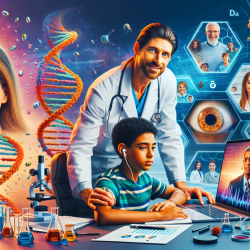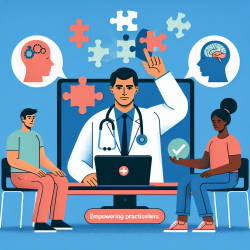Empowering Change: Harnessing Genetic Insights to Transform Duchenne Muscular Dystrophy Outcomes
In the realm of speech-language pathology and therapeutic interventions, data-driven decisions and evidence-based practices are paramount. The recent study titled Mutational spectrum and phenotypic variability of Duchenne muscular dystrophy and related disorders in a Bangladeshi population offers groundbreaking insights that can significantly enhance the care and outcomes for children with Duchenne Muscular Dystrophy (DMD).
Understanding the Research
Duchenne Muscular Dystrophy is a severe neuromuscular disorder primarily affecting boys, characterized by progressive muscle degeneration and weakness. This study, conducted in Bangladesh, provides a comprehensive analysis of the genetic mutations associated with DMD in a cohort of 36 participants. The research employed a cost-effective diagnostic strategy, combining multiplex PCR and whole exome sequencing, to identify critical genetic variants.
The findings revealed two critical hotspot regions in the DMD gene, where most deletions were concentrated. Moreover, novel pathogenic mutations were identified not only in the DMD gene but also in other related genes such as SGCD, DYSF, COL6A3, and DOK7. These insights are invaluable for clinicians aiming to refine diagnostic approaches and tailor interventions for DMD patients.
Implications for Practitioners
For practitioners in speech-language pathology and related fields, these findings underscore the importance of integrating genetic insights into therapeutic planning. Here are some practical applications:
- Early Diagnosis and Intervention: Understanding the genetic underpinnings of DMD can facilitate early diagnosis, allowing for timely intervention and potentially slowing disease progression.
- Personalized Therapy Plans: By identifying specific genetic mutations, practitioners can develop personalized therapy plans that address the unique needs of each child, enhancing the effectiveness of interventions.
- Comprehensive Care Coordination: Collaborating with geneticists and other healthcare professionals ensures a holistic approach to managing DMD, addressing both physical and developmental challenges.
Encouraging Further Research
While this study provides significant insights, it also highlights the need for further research. Practitioners are encouraged to engage in or support ongoing research efforts to expand our understanding of DMD and related disorders. By contributing to the growing body of knowledge, we can continue to improve diagnostic accuracy and therapeutic outcomes.
To read the original research paper, please follow this link: Mutational spectrum and phenotypic variability of Duchenne muscular dystrophy and related disorders in a Bangladeshi population.
Conclusion
The study on DMD in the Bangladeshi population is a testament to the power of genetic research in transforming healthcare outcomes. By leveraging these insights, practitioners can make informed, data-driven decisions that enhance the quality of life for children with DMD. As we continue to explore the genetic landscape of neuromuscular disorders, the potential for improved interventions and therapies grows, offering hope and empowerment to families and children worldwide.










